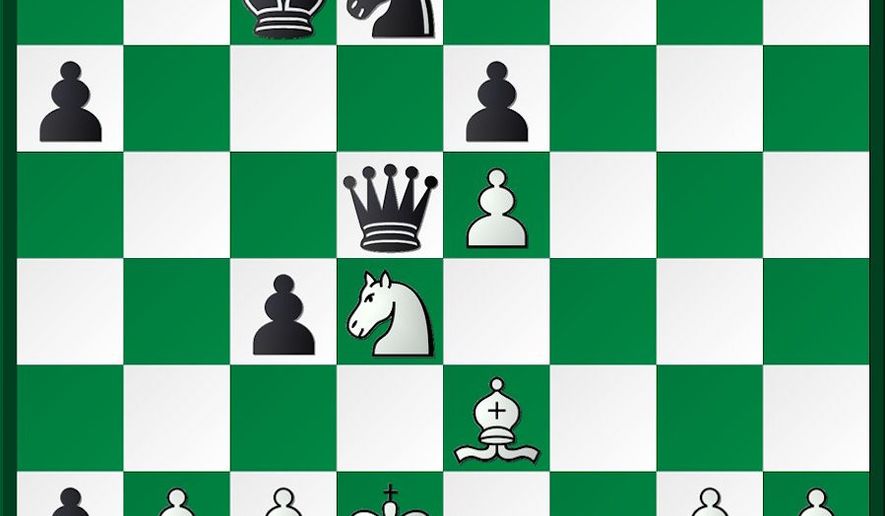He’s been overshadowed by the U.S. “Big Three” and can hear the footsteps of a rising generation of American grandmasters eager to claim their place in the pecking order.
But at the just-concluded U.S. Championship tournament held at the Chess Club and Scholastic Center of St. Louis, California GM Samuel Shankland proved he’s still very much a force to be reckoned with, following a stunningly assured 8½-2½ result that brought the 26-year-old Californian his very first U.S. national title.
A former U.S. junior champion perhaps best known for his gold medal performance as a reserve on the 2014 Olympiad U.S. team in Norway, Shankland found a winning formula in St. Louis starting with the fact that he played better and more solidly than anyone else. He comfortably drew his games with the pre-tournament favorites — GMs Fabiano Caruana, Hikaru Nakamura and Wesley So, each among the top-10 rated players on the planet. He scored four of his six wins with the Black pieces. And he finished strong, with two quality wins in his final two games to hold off a hard-charging Caruana by a half-point.
In the concurrent U.S. Women’s Championships, another upstart Californian, FM Annie Wang, nearly pulled off an even bigger upset, leading for much of the event before finally being caught by 2016 women’s champ and former University of Maryland-Baltimore County star WGM Nazi Paikidze in the very last round. After the two finished at 8-3, the more experienced Paikidze won Monday’s hard-fought tiebreaker, losing the first rapid game, winning the second and then triumphing in a blitz “Armageddon” game for her second U.S. women’s title.
Shankland’s title-clinching game was typical of his tournament, outplaying rising star GM Awonder Liang from the opening of this sharp Panov-Botvinnik Caro-Kannline right through to the endgame. With Caruana defeating GM Alexander Onischuk a few boards away, White knew he needed the full point to avoid a playoff.
Liang’s 7. Qb3 e5!? (7…Na5 and 7… Qb6 were safer alternatives) all but guarantees a sharp game, but after 8. h3! (home cooking from a well-prepared Shankland) exf4 9. hxg4 (giving the White rook a very important half-open file) Qe7+ 10. Kf1 0-0-0 11. Nd2 g6 (Nxg4?? 12. Bf5+) 12. Re1, White’s forces slowly but surely occupy the more useful posts.
On 17. Qa4 Rd6?! (the rook proves awkwardly placed, and White can now target Black’s weak points in the center and on the kingside) 18. Nb3! (repositioning his one underperforming piece; White is close to strategically won here) b6? (tougher was 17…a6) 19. Nc1 Nb8 20. Nd3 Kb7 21. Nb4 Qd8 22. Ne5 Qc7 (Bxe5 23. dxe5 and the rook has no retreat) 23. Qb3, Liang has to jettison his h-pawn just to keep his center from collapsing.
Already a pawn up, White infiltrates decisively after 33. Nde5 Bxe5 34. Nxe5 Rd6 35. Qe8!, when 35…Nxg5 is met by 36. Nxf7! Qc4+ (Qxf7 37. Re7+) 37. Kg1 Nxf7 38. Qxf7+ Ka6 39. Qxf4 and wins. Shankland wins a second pawn and just after time control, Liang resigns facing 43…Nf3 44. Nxd5! Rxd5 45. c4+.
Caruana, gearing up for a world title match this fall against Norway’s Magnus Carlsen, played excellent chess (marred only by an upset loss to GM Zviad Izoria) and should be happy with his 8-3 result. His powerful play was on display in the final winning attack against GM Varuzhan Akobian in this Round 7 game. We pick it up from today’s diagram, where Black, trying to hold his position together long enough to cash in his advanced a-pawn, has just played 25….Qc6-d5.
White concludes things smartly with 26. Qxe6! Qa5+ 27. c3 Nxe5 (a1=Q 28. Rxa1 Qxa1 29. Qd6+ Kb7 30. Qd5+ Kb8 31. Nc6+ Kb7 32. Na5+ Kc7 33. Qc6+ Kd8 34. Bg5+ Ke8 35. Qe6+ Kf8 Bh6 mate) 28. Rf7+! Nxf7 (Bd7 29. Rxd7+ Nxd7 30. Bf4+ Kd8 31. Nc6+ Kc8 32. Qe8+ Kb7 33. Nxa5+ Kb6 34. Qxa8 a1=Q 35. Qb7+ Kxa5 36. Qb4 mate) 29. Bf4+ Kb7 30. Qxf7+, and Black resigned ahead of 30…Kb6 31. Qc7 mate.
Shankland-Liang, U.S. Championship, St. Louis, April 2018
1. e4 c6 2. d4 d5 3. exd5 cxd5 4. Bd3 Nc6 5. c3 Nf6 6. Bf4 Bg4 7. Qb3 e5 8. h3 exf4 9. hxg4 Qe7+ 10. Kf1 O-O-O 11. Nd2 g6 12. Re1 Qc7 13. g5 Nh5 14. Be2 Ng7 15. Ngf3 Ne6 16. Bb5 Bg7 17. Qa4 Rd6 18. Nb3 b6 19. Nc1 Nb8 20. Nd3 Kb7 21. Nb4 Qd8 22. Ne5 Qc7 23. Qb3 Rhd8 24. Rxh7 a6 25. Bd3 Ka7 26. Qa4 a5 27. Bb5 Kb7 28. Nbd3 Rg8 29. Nf3 Rh8 30. Rxh8 Bxh8 31. a3 Nc6 32. Bxc6+ Rxc6 33. Nde5 Bxe5 34. Nxe5 Rd6 35. Qe8 Rd8 36. Qxf7 Nxg5 37. Qxc7+ Kxc7 38. Nxg6 f3 39. Nf4 Kc6 40. gxf3 Nxf3 41. Re6+ Kb5 42. Ke2 Ng1+ 43. Kd3 Black resigns.
• David R. Sands can be reached at 202/636-3178 or by email dsands@washingtontimes.com.
• David R. Sands can be reached at dsands@washingtontimes.com.




Please read our comment policy before commenting.